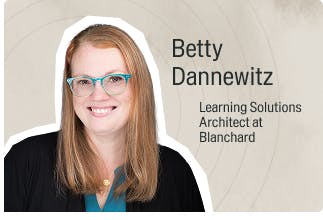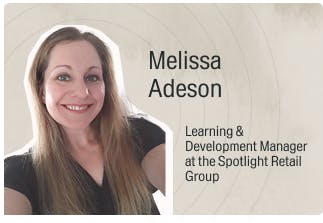Empowering frontline leaders: Lessons from fast food to Fortune 500 with Monica Rothgery
About the guest
Monica Rothgery began her career as a Taco Bell restaurant manager and rose to become the first woman COO of KFC in the U.S. and later, the first LGBTQ executive in the C-Suite at Yum! Brands. Dedicated to empowering frontline leaders, Monica inspires transformation through storytelling as a sought-after speaker.
Monica’s lifework is helping leaders, especially frontline leaders discover what is theirs to do and realize their potential to change lives, starting with their own. A sought-after speaker, Monica’s uses the power of story to entertain and empower leaders around the world.
Her upcoming book, Lessons from the Drive-Thru: Real Life Wisdom for Frontline Leaders, shares insights on servant leadership, emphasizing teamwork, authenticity, and resilience.
Transcript
Dan: Welcome to L&D in 20, your go to resource for all things workplace learning brought to you by Go1. I'm your host, Dan Hayward, Chief Customer Officer here and industry veteran. Today we'll be speaking with Monica Rothgery. Monica is a sought after keynote speaker, consultant, and author who is on a mission to help organizations unlock pent up productivity.
And growth by empowering their frontline leaders. Monica started her career as a restaurant manager for Taco Bell. 30 years later, she was the first woman COO of KFC US. She's the author of the great book, Lessons from the Drive Thru, Real Life Wisdom for Frontline Leaders. And today we'll be chatting about empowering frontline leaders.
Monica, welcome to the show.
Monica: Dave, what's up? How's it going, man?
Dan: It's going great. Awesome to see you again. As a former KFC assistant manager from the UK, I'm really excited for this topic and the fact that we're going to be discussing, you know, empowering frontline leaders and the best practices that, that you've seen and that you offer for really creating impactful learning opportunities.
Monica: Yeah. Like, I mean, we worked together for a while at Yum and CrossPass when you were in talent. Right. And, and that was a great, Yum was always a great place to experiment with, like, how do you really use L& D to not just put out programs, but to drive the business. Right.
Dan: So for some of our listeners who may not know what Yum is, do you want to give us a quick overview of just the scale of that business and, and, you know, and the size of the, yeah, the size of the, you know, the operations you were leading.
Sure. Thank you.
Monica: So Yum Brands is the largest restaurant company in the world if you count sheer number of restaurants and all the brands they own. And right now they own four brands, Taco Bell, KFC, Pizza Hut, and Haberberger Grill. If you count just one brand of restaurants, McDonald's would be the biggest.
So it's a huge, you know, restaurant company. And I was fortunate enough to work in all three brands and most recently, or the last job I had was the COO for KFC in the U. S. So I ran one Taco Bell restaurant when I started my career and I ran 4, 000 KFCs in the United States before I retired and started my new passion to help companies get their frontline leaders empowered and excited and engaged.
Dan: That's amazing. That's amazing. So if we think about it, that's well over probably 15, 000 frontline leaders at KFC that you were servicing from kind of shift leaders all the way through. You have many thousands. So as you think about that kind of context, what unique challenges did you see that frontline leaders in the service or the retail industry face when it comes to L& D and how can kind of L& D teams that are listening now kind of best help to address some of those needs?
Monica: Well, you know, Dan, I mean, the restaurant manager, we'll just talk about restaurants for a second. It's just such a unique proposition. First of all, it's a retail store and a product, a manufacturing facility, all under the same roof, right? Raw product comes in the back and they have to turn it into a pizza or fried chicken or tacos.
And then 10 steps from where they make that, they have to turn around and sell it. And so they have to have skills in retail, in customer service, in, you know, delivering speed and accuracy, and they have to have skills in production, efficiencies, standard operating procedures, food safety in our case, procedures to make sure that the, all of the ingredients are handled safely so people don't get sick.
So all that happens under one roof led by what, you know, a 27 year old leader whose experiences. Last week, they were the shift manager and they lead a workforce that are mostly entry level with, you know, extra high turnover. So these frontline leaders is, I think it's one of, you know, I had a lot of jobs, I was an army and I was an army officer and I tell everybody that the hardest job I ever had was running a restaurant for the reasons I just said.
You have a lot of turnover, you have a lot to train people on, everything happens really fast. And you throw all that together and it's a really big learning challenge. It's just a big execution challenge.
Dan: Yeah, absolutely. It's competing priorities that, you know, you don't, you absolutely do not control from kind of open 7am in the morning all the way through to close.
Monica: That's a great point. You brought up day parts. Yeah. What other, what retail store, what factory, you know, well, factories might have 24 hour shifts, but yeah, you open at, you know, seven or eight in the morning and you're open until two in the. Two in the morning. It's a challenge. It's tricky.
Dan: So then as in your, yeah, your experience, I know it's vast and vast in terms of kind of innovation, trialing, testing different things.
Was there anything that you saw that kind of really stuck any specific kind of format or content delivery that you've seen work particularly well for this, this environment and for these, these frontline leaders?
Monica: Yeah. So I want to go back even one step further from there and I want to invite leaders In learning and development to position themselves as partners to operations, way that you can support your operations partners and the people in your units, whether they're retail stores or hair salons or oil change, you know, facilities or restaurants is to make it easy.
Simplify the operation as much as possible. When there's less to know, there's less to train. There's a lot of complexity that gets built into unnecessary complexity that gets built into operations that if you can partner with your operators and say, well, like, You have four size cups. Do you really need four sizes of drinks?
What if we cut that down to two, medium and large? And they'll say, well, what about kids meals? Well, how many kids meals do you actually sell? And so if you can get, partner with your operators to get them to think about simplifying the operation, making it easier, then you have less time. Things you need to train.
That's step one. Step two is how do you make, how do L and D folks help make. The execution foolproof. What job aids can you put in place so that it's impossible to make mistakes? These would be things like job aids built into the wrap. Here's an example. At Taco Bell, you have a wrap that the burrito goes in.
Well, on the inside of the wrap, we put little lines to show how to line it up. So they never again, never again had to say or, you know, put the burrito three inches. into the center of the rack. There's a line there. They don't, they, that kind of creativity and engineering can help execution. And then you don't have to train that.
You don't have to memorize it. The more we can get those kinds of in station job assistance tools to make it easier and foolproof, the better, more successful we're going to have. And then there's job aides at the workstation. And then ultimately what you asked about is content delivery, right? And what I would say about content delivery in 2024 is fast and short and at the workstation.
You know, I think, you know, we could talk about content delivery via LMS, you know, but ultimately hands on work is learned.
Dan: Yeah, no, I love that. Meaning, you know, it's kind of learning in the flow of work. Like the reality is you can't get past the wrap, like you can't get past that sheet that's there.
That's great. And that she just reminded me, one of the things that really impressed me about YUM was we don't have headquarters. We have restaurant RSCs, restaurant. Support centers, right? And I think kind of like that kind of that mindset sometimes in the day to day it's missed, but I think when it's really functioning best, it's really enabling or each of those corporate functions enabling the success of the restaurants to service those customers.
Yeah, if the
Monica: frontline leader can't execute what the marketing team or the operations team wants them to do, then the customer experience won't be what you want it to be.
Dan: Yeah. I
Monica: remember once in Thailand, I was a COO of KFC in Thailand, and once in Thailand they wanted to put a sprig of parsley on the plate, on the rice bowl, and I'm like, no guys, it's not gonna happen.
And we're not a fine dining restaurant or, you know, QSR or quick service restaurant. And that sprig of parsley between managing the produce, making sure it's clean and safe for consumption, and then making sure that the right size sprig of parsley ends up at every dish. It's not worth. It's not worth the upside that you think you're going to upscale the.
So that's a good example of like really standing up for simplification and not complexity.
Dan: And I think one of the things that obviously I read your book, it's great. Like it, yeah, there's a lot of kind of scenarios and stories that you tell there that, you know, if anyone has worked in any kind of quick service restaurant or any service environment, you know, you connect to it.
But I think one of the questions that I wanted to kind of call back to one of the first things you said was, Literally, you could be the shift manager yesterday and you're the assistant manager today. And, you know, at some point, six months in the future, you're the store manager and you may have started in the last year.
And so one of the things that I was interested in was the, you know, how do you, how do we equip those leaders from a cultural, maybe like a soft skills perspective? So I was wondering if you can kind of maybe connect the two there, because I think, I do think it, it very much is top down. People learn from what they're seeing and how the area manager and the regional manager is operating.
Monica: One of the beautiful things about our industry is that you can grow. You can start out as a cook or a dishwasher and find yourself, and not in 20 years, you know, like a lawyer, it takes 20 years to make partner. In a matter of a few years, you could go from line cook or dishwasher to running the restaurant.
And, you know, having a real opportunity, like a career where you can provide for your family, send your kids to college, buy a home. And so that's, I think makes our industry really special. I always tell people there are more, there's more opportunity than there is will people willing to be leaders. And so if you want to, it's there for you, that's a plus, that's an upside.
But then there is the responsibility on the organization because all that young leader person knows. Is what you've taught them. They haven't worked anywhere else. They didn't go to school for leadership. They only know what you've taught them. So everything starting from the most basic tasks around leadership has to come from your organization.
And whether that's mentorship, whether that's putting people in learning circles and having, you know, above restaurant or more senior leaders talk to them about the duty of care. What it means to be a leader, how to love and engage on your team, how to do things like delegate, have crucial conversations, hold people accountable.
They don't know how to do all that. In the absence of an organization telling them, they will either make it up, but most often they'll mimic what they've seen, which, if it wasn't good, will just create disruption, and ultimately turnover. So the responsibility lies squarely on the shoulders of the organization.
And I think you have to use, the organizations have to do it well, use every lever possible from mentoring to classroom training to, you know, even giving books like mine. I had one franchisee say, I'm going to give every new shift manager a copy of your book because it's so easy to digest. And they immediately understand that their role isn't to be a boss, it's to be a servant leader, right?
Dan: That's great. That's awesome. I keep having kind of flashbacks. It's like, yeah, I started off making the, the gravy in the old school KFCs when we used to make it, make it from the crackling coming out of the Henny Pennies. That was my job. Like every Saturday I would just go in and make the gravy. It was so much fun.
So now we'll move on to our next segment. It's the 60 second budget breakdown.
So obviously, you know, you're working and consulting with a lot of different businesses. So we're really interested to think about where you maybe advise them or the most important things that you're seeing that they're spending their money on right now.
Monica: The biggest problem I see in organizations is that often everyone's doing the job of the person underneath them.
And so you have shift managers. Who can't really run shifts, they're just team members with keys. And then your restaurant manager isn't really running the business, running the restaurant, she's busy running shift to shift just to survive. And so, the advice I have, place to invest, is to build self sufficiency starting at the bottom level.
Your shift manager, who you're paying them a premium, should be able to run a shift. You should be able to leave them alone, and they should be able to lead the team, make sure the guests get served, all the administration and food safety things get done, and that's the definition of someone who is self sufficient in their role.
They don't need to call anyone. Once you have the bottom level of your organization, the first level of leadership, self sufficient, then you unlock. The potential for your restaurant manager or the next level up to do something different. And then, so your next responsibility then as an organization is to teach them, okay, you don't have to make food.
You don't have to work the shift. You don't have to make sure that the team members are all deployed. Your shift manager is going to do that. So what do they do? Then they don't know what to do. This is where we have to teach skills like, Sales building, analyzing their P& L to find profit opportunities, building check, increased frequency.
These are skills they don't know, and so if you want to get more sales, drive more growth from your frontline leader, the organization can teach them those skills, and then it goes up to the next level. Every organization you and I have worked with, Dan, has top tier managers. And then we send them to, you know, best of the best or top 100.
Well, those guys do something that the other guys don't. And so I would challenge, especially L& D organizations, find out what is it that top tier does and then train the rest of the organization to do that. Build the rest of those skills into your wiring, your compensation, your incentives, what you measure.
I'll give you an example. We did this and one of the things that the top tier What leaders do is they have five self sufficient junior managers, assistants and shifts. Now the number is based on your volume and your brand, but that was something they all had in common. And so they realized this is such a powerful thing that became a KPI.
You know, we took off turnover because turnover is a hard thing to measure, but measuring self sufficient managers, how many managers aren't just certified but can actually do the role. Was an unlock. So if I was a franchisee, if I was running a brand, a portfolio of units, I would first invest in my very first frontline leader so that I'm not over, they're not just overpaid team members, then I would invest in frontline leaders.
In, in leadership skills, in development skills, in sales building skills, right? You don't, we don't, we didn't need to teach them how to make chicken. They were awesome at that. We didn't need to teach them anything about how to do things in the restaurant, but we needed to teach them how to think and behave and like leaders and business owners.
That's where I would spend my dollars.
Dan: That's great. I think, yeah, absolutely. Raising that horizon. So moving on to the next segment, Lifelong Learnings.
We'd love to hear from you about a situation where something, you know, a situation turned out differently to what you expected, either positive or negatively from a, from a learning perspective.
Monica: When I got to Thailand, I had gone there to be the head of HR. The business was about I don't know, 400 restaurants, no, maybe, yeah, 450, couple hundred were owned by one franchisee and the rest were owned by, by the company.
And after I was there six weeks, the general manager, her name is Phum, Khun Phum came to me and asked me to be her COO. Now my wife and I had already relocated from Southeast Southern California to Bangkok and now she was asking me to not be the head of HR. But be the chief operating officer. And I couldn't think of a worse idea.
Number one, I don't know how to make chicken because I'd only worked in tacos and pizza. I'd been out of operations for 15 years, 20 years. I'd been in HR and training. And the third reason is I didn't speak Thai and all the reports were in Thai and all the managers and the team members in the restaurants didn't speak English.
It was one of those junctures where you're like, okay, what am I going to do? I told her, I think it's a bad idea. She said, you're going to be fine. And that's kind of the first thing I would want to share is when you tell someone you're going to be fine, you've got this. You put your faith in them. You tell them you believe in them.
It's remarkable what people can rise to and do. And, you know, with her support, I, you know, I was able to do that job. The other thing I did was I put on the hat of a learner. Like for 15 years, I've been in. Learning and development. I've been in HR telling operators, this is what you should do. Could I do it?
I've been telling them, this is how they should, this is what you should lead. This is how you should communicate. This is how you should do strategy. Now, could I do it? Could I practice what I preach? And it was a really sometimes humbling, but fun way to say yes to an organization. And that I think is the lifelong learning is like saying, yes, when opportunities arise, don't be too siloed in what you think is your, your path, because that's when amazing things open up and happen.
Dan: And it led to so much more like coming back to, yeah, that's phenomenal. That's great. And so now for our final segment, self development hacks.
What would be your personal, your favorite kind of self development hack or learning resource? Where do you go to, where do you go to grow?
Monica: Yeah. It's funny, I'm an entrepreneur now, okay? So for two years I've been building my own speaking consulting business and I don't know anything about what I'm doing.
And so I'm reaching out and trying to find avenues. to build my know how. And it's so fun because it's all new. And then I've reflected back on my restaurant career and what I realized is I probably spent too much time being insular and not enough time looking out. And if I could do something different in my career, it would have been to spend A lot more time networking with other leaders in the industry, other associations, service providers, vendors, because when you're like this, you only know what's around you.
And I, I think I limited my understanding of solutions. By not looking out more. And so I wish I would have, I wish I would have met a lot more people outside of my immediate sphere and just to have coffee with people. It's amazing what you can learn and the commonalities that you find and then the solutions you realize you can apply.
Dan: I love that insight. Thank you, Monica. Really appreciate you coming on the show today and sharing all of your insights. So thank you so much, Monica Rothgery.
Monica: Oh, you're most welcome, Dan. Great to be
Dan: here. Thanks for tuning into the show. I'm Dan Hayward, Chief Customer Officer, and that wraps up another episode of L& D in 20.
We hope you found today's discussion as engaging as we did. Whether you're listening on the go or at your desk, we'll catch you on the next episode. Until then, keep on learning.
Related Podcasts

Resilient Leadership in Times of Rapid Change with Betty Dannewitz, Learning Solutions Architect at Blanchard

Beyond the Launch: Turning Great Learning Programs into Lasting Engagement Campaigns with Melissa Adeson from Spotlight Retail Group

Building Learning Cultures: Aligning people, purpose and performance to make learning a habit with Melody Wong

Building thriving HR & L&D careers in the age of AI with Dr. Dieter Veldsman, Chief Scientist at the Academy to Innovate HR

Train smarter, spend less
Train smarter,spend less
Connect with a Go1 expert to explore the best training options for your organization—no pressure, just solutions that work.